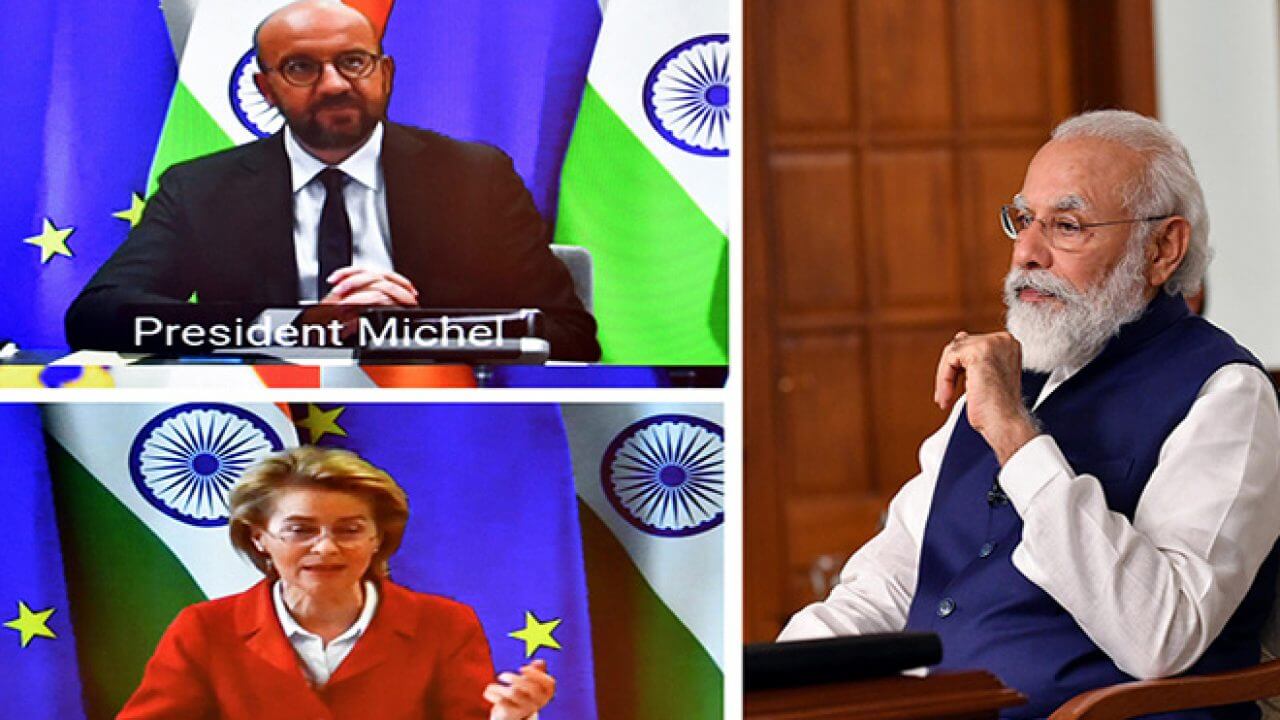On Saturday, India’s Prime Minister Narendra Modi participated in the virtual India-European Union (EU) Leaders’ Meeting alongside representatives from the 27 member states of the bloc and European Council President Charles Michel.
The discussions covered a wide range of topics, with both sides expressing their willingness to strengthen the India-EU Strategic Partnership. They discussed the COVID-19 pandemic and the unprecedented economic and social losses caused by the outbreak. In this regard, EU leaders expressed their support for India’s ongoing efforts to counter the COVID-19 pandemic in India. Meanwhile, Indian premier Narendra Modi expressed his gratitude to the EU for medical supplies that had been delivered to help with shortages faced by Indian healthcare facilities. Consequently, the two sides agree to further a “better, safer, sustainable, and inclusive recovery”.
According to a statement released by the Indian Ministry of External Affairs, the themes that drove the leaders’ discussion were: foreign policy and security COVID-19, climate and environment, trade, connectivity, and technology. Consequently, the two sides agreed to launch a “Connectivity Partnership” that aims to bolster “digital, energy, transport, and people-to-people connectivity.” This partnership, the statement said, will be grounded on their shared commitment towards “social, economic, fiscal, climate and environmental sustainability, and respect for international law and commitments.”
European leaders, along with PM Modi, also reiterated their support for a “free, open, inclusive, and rules-based Indo-Pacific”. This comes less than a month after the European Council adopted the ten-page-long “[European Union] Strategy for cooperation in the Indo-Pacific”, which aims to determine the bloc’s approach and involvement in the region. The document aims to strengthen the bloc’s cooperation with its allies in the Indo-Pacific.
One of the most significant outcomes of the summit was the resumption of discussions on a Free Trade Agreement. In this regard, a joint statement published following the discussion said that both sides were committed to a balanced, ambitious, comprehensive and mutually beneficial trade agreement.” Speaking to the Indian Express, an Indian official said that the resumption of the discussion on a Free Trade Agreement is indicative of the two sides’ desire to “harness the full potential of [their] economic engagement”, specifically in light of the COVID-19 pandemic. Moreover, they agreed to launch stand-alone discussions on an investment protection agreement and an agreement on geographical indications.
While both the EU and India have expressed the importance of such a deal since 2007, the conversation has been halted since 2013. A conclusion to talks promises benefits to both parties and is expected to further expand already growing two-way trade. In 2018-2019, India exports to the EU were estimated to be worth $57.17 billion, and imports from the EU were worth $58.42 billion.
However, there are several issues that the two pair disagree on. The EU has previously complained that the Indian side refuses to adequately open up its automobiles and wine and spirits market to the EU. India has also been reluctant to allow European firms access to its financial sector, specifically for “banking, insurance and e-commerce”. Moreover, the EU’s insistence on including issues such as labour regulations and environmental laws into the Free Trade Agreement is also unacceptable to India. In the past, these have proven to be points of major contention between the two parties and are likely to obstruct a smooth negotiation. Acknowledging this, along with the importance of the European market, over the past year, India has also held discussions with several European leaders, including representatives from Luxembourg, Denmark and Italy, to seek their support for a Free Trade Agreement between the two sides.
While Saturday’s discussions were an overall success for their economic partnership, India failed to secure the EU’s support for its proposal in the World Trade Organisation (WTO), calling for a waiver of specific provisions of the Trade-Related Aspects of Intellectual Property Rights Agreement for COVID-19 vaccines. Charles Michel said that the European leaders believed that this would not be a “magic solution” to the issue and vowed to “keep a close eye on it.” Nevertheless, he reiterated the EU’s support towards providing equitable access to vaccines and ensured their support from the COVAX facility. Securing the EU’s support for the proposal will be critical for India as it prepares for further discussions on the matter at the WTO, which are scheduled to be held in the coming weeks.
India-EU Summit Results in Relaunch of Free Trade Agreement Talks
India and the European Union launched a Connectivity Partnership that covers cooperation in several sectors, including technology, energy, and transport.
May 10, 2021

SOURCE: ORF
